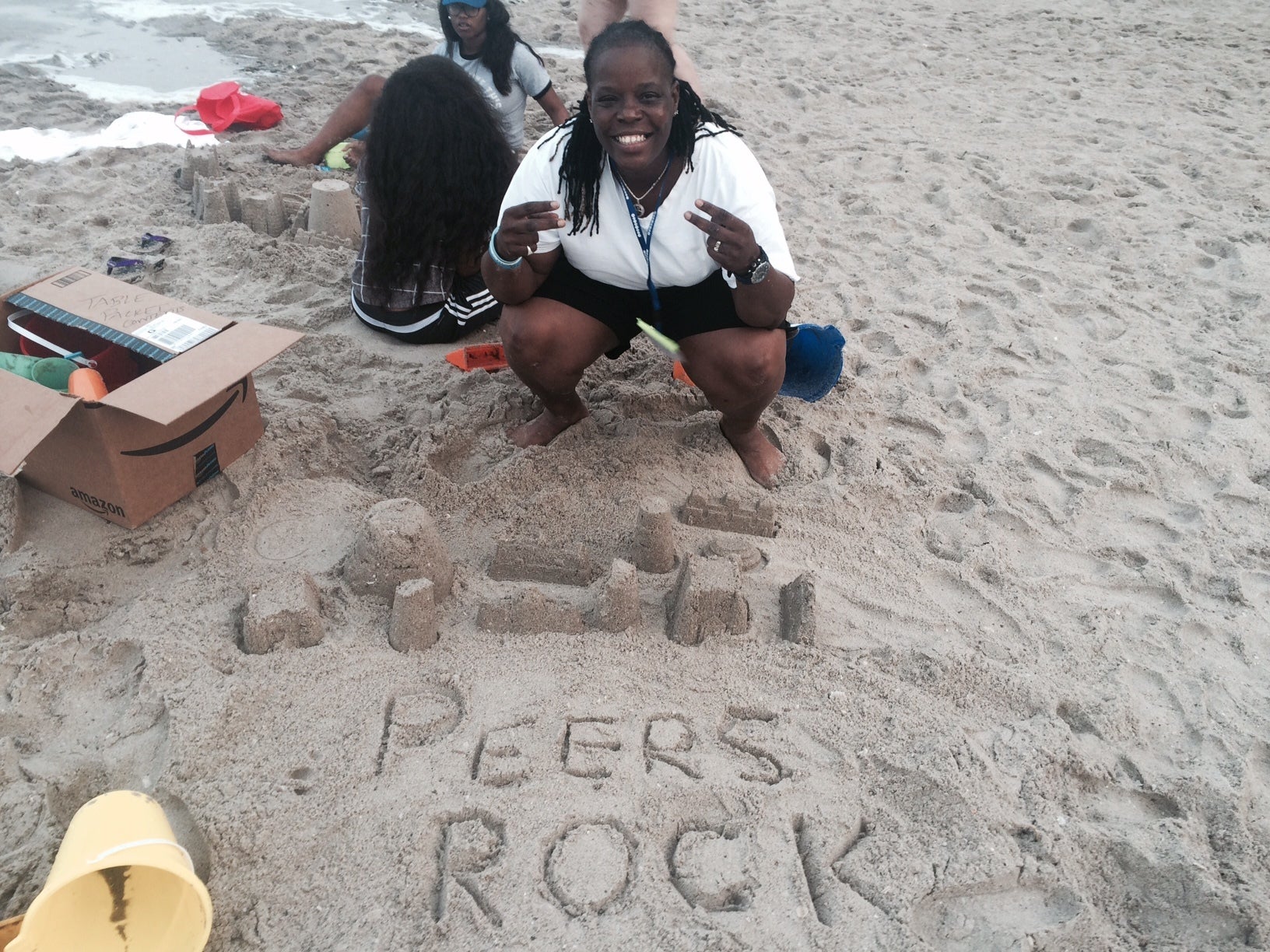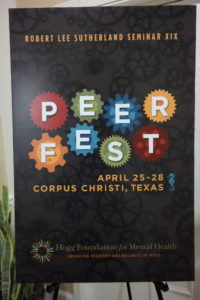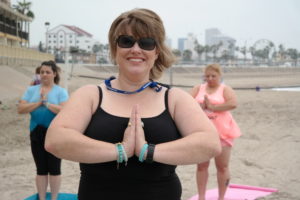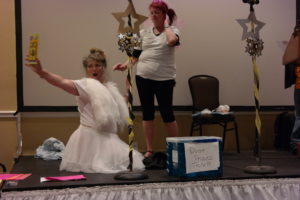
A Joyful Noise: Peerfest
Inside this story:
- In April 2016, the Hogg Foundation presented the first-ever PeerFest, an event organized by and for mental health consumers.
- The purpose of the event was to inspire and connect Texans who are new to recovery through a restorative, empowering mix of practical and experiential activities.
- The event was a uniquely collaborative endeavor combining the resources of the Hogg Foundation with the emerging leadership of the peer community in Texas.
- The first PeerFest was considered a resounding success by both organizers and attendees, a testament to the hard work, vision and creativity of the 25-member planning committee.
Empowerment. Modeling recovery. Not your usual conference. Life-changing. All of these themes resound in the prideful accounts of three individuals—Jill Jendrzey, John King and Teena Perry—who played key roles in planning PeerFest 2016, a four-day event that took place in Corpus Christi, Texas in April 2016.
It’s Jendrzey who offers up a telling anecdote that truly captures the tone of the event.
“In conversation with one of the participants, just sharing that feeling that people felt with connection, she just kind of sighed and was like, ‘It was like a joyful noise.’ It summed up the experience for not just her but for a lot of people.” Jendrzey said.
“Noise” isn’t typically thought of as a desirable outcome for a professional conference. But PeerFest, modeled on the national Alternatives Conference, offered attendees a restorative mix of the practical and the experiential – sessions on neuroplasticity mingled with workshops on therapeutic drumming; an evening discussion of essential oils could cap off a day that included beach yoga or a tour of the Texas State Aquarium.
This eclecticism reflects both the better judgment of the planning committee and the prevailing ethos of Alternatives: an event by and for consumers. The newer term “peers” is a shorthand for the lively and assertive community of mental health consumers who engage and connect through experiences like PeerFest and through a shared identity as people who are living recovery.
“In conversation with one of the participants, just sharing that feeling that people felt with connection, she just kind of sighed and was like, ‘It was like a joyful noise.’ It summed up the experience for not just her but for a lot of people.”
Handing it Over to Peers
Jendrzey, King and Perry are all certified peer specialists—individuals with lived experience of mental health challenges and recovery who now use that experience to help empower other mental health consumers. They were part of the original 25-member planning committee, which brought together peers from various walks of life for a single purpose: to make an Alternatives-style event under the Hogg Foundation banner.
Event Funding
The foundation spent around $250,000 to fund the event. From the outset, there were challenging discussions about how much control the foundation would cede to the design committee, and whether it truly served the foundation’s interest to submerge its own brand identity under that of PeerFest.
The concept for a Texas-style Alternatives was originated by Tammy Heinz, Hogg Senior Program Officer and Consumer & Family Liaison. In addition to marshalling internal resources and support, she had to guide the deliberations of the planning committee, helping all of the innovative suggestions coalesce into a shared vision.
“You’re trying really hard to turn over as much of the work and the decision-making as you can, but there’s also a need to facilitate to keep it moving,” said Heinz. Heinz had to rely greatly on her instincts as an experienced facilitator to know when to push the planning committee, and when to pull back.
“There’s a real challenge with trying to motivate the committee without it feeling like you are taking over,” said Heinz.
Ultimately, the foundation made a conscious effort to restrain its more traditional paternalistic impulses. The consensus is that this restraint paid off in a big way.
A Texas Alternative

The official PeerFest poster.
The first Alternatives Conference was held in 1985, organized by On Our Own of Baltimore and funded through the National Institute of Mental Health Community Support Program. The event was an outgrowth of the psychiatric survivor movement that sprang up in the mid-1970s. The event name pays tribute to the movement of mental health consumers and their heartfelt desire for an “alternative” to the traditional medical model of psychiatric treatment. Eventually, the funding moved to the Substance Abuse and Mental Health Services Administration (SAMHSA) and continued for over 30 years.
In 2018, SAMHSA stopped funding the national Alternatives Conference putting the event’s future solely in the hands of the attendees. Alternatives 2018 and 2019 were held in Washington, DC with limited attendance due to lack of financial support. It was recently announced that Alternatives will be partnering with another peer conference in Oregon called Peerpocalypse to hold a partial Alternatives at their annual event in April 2020.
For Texas veterans of Alternatives, PeerFest is thus an opportunity to ensure that Texan consumers don’t miss out on the chance to experience the immersion in learning, networking, peer support and solidarity that an Alternatives-like event can offer.
For the first-timers, it mattered to PeerFest organizers that they feel free to express their authentic selves while in the event space. This is reflected in the four tracks used for event programming: Listen and Learn; Let’s Talk About; Learn by Doing; and Play and Connect.
Attendees Served
All three peer specialists agree that the sheer diversity of content and experiences offered was PeerFest’s most noteworthy achievement.
“On the ground, we got nothing but glowing reviews”, said King. “I think we really exposed many, many people to the concept of recovery; many people who had never been exposed to it before.”
“The carried over energy lasts beyond a year, two years.” said Jendrzey. “I would have people go through my (WRAP) classes or run into them in different places, and the joy that was sparked from that experience of mutual connection—it was money well spent.”
Hands in the Pot

Kate Anderson, PeerFest planning committee member, and her dog relax while looking out over the water.
The PeerFest planning committee had a difficult juggling act to pull off. It was an experiment in seeing whether the principles dear to the peer community (authenticity, consensus, mutuality, equality among participants) could be upheld in the context of an event planning process that demands decisions be made in crunch time.
In particular, the size of the committee presented challenges. And its consensus model of decision-making meant that any one person could block a course of action and prolong debate.
“Whenever you’re in a committee everyone has their own thoughts about how things should be done, and that’s fine, but when you have 20 people that’s just too many hands in the pot,” said Perry.
King concurs. “I don’t think that for something like this you can always come to consensus, especially when you have so much to do in so little time.”
Looking to the Future
The second-ever PeerFest will be taking place April 27-29, 2020 in Galveston, Texas. The planning committee has been scaled down to 12 members, six of them veterans of the first PeerFest planning committee and six emerging leaders. This time, the foundation granted funds to a second organization, Via Hope, who is overseeing the planning.
Even with all of the challenges, all agree that the end result was worth it. To see a ballroom full of peers hamming it up for the final night’s “Peers Got Talent” competition, for example, is to see the overall vision for PeerFest 2016 in full, colorful splendor.
“We produced a product that we weren’t sure we were going to get, but what we got was magical,” said Perry.
Making the magic happen took a lengthy process of ideation, discussion and revision, one in which the planning committee constantly strove for the right balance between collaboration and self-assertion. The final product was a milestone on the way toward a true Texas alternative.
Jill Jendrzey, MHPS, ALF, is a mental health peer specialist from San Antonio. Her passion in the field led her to become an Advanced Level WRAP Facilitator and a well-traveled speaker on mental health and recovery. She has seven years of experience training new peer support specialists as a contract trainer for Via Hope, and trained for SAMHSA’s Recovery to Practice initiative for psychiatrists across Texas. She is the founder of JOY Journey Peer Connection.
John King, MHPS, WRAP Facilitator, is a mental health peer specialist currently living in Austin, TX, where he works as a trainer for Via Hope – Texas Mental Health Resource. He also serves on the Protection and Advocacy for Individuals with Mental Illness (PAIMI) Council for Disability Rights Texas.
Teena Perry, LMSW, MHPS, is a social worker and mental health peer specialist from Dallas, TX. She has worked with Depression and Bipolar Support Alliance-Dallas as a support group facilitator and National Alliance on Mental Illness North Texas (Dallas) as a board member, public speaker, support group facilitator, peer-to-peer mentor, and a state trainer and contract trainer. She is currently a social worker at Child and Family Guidance Center in Dallas.


